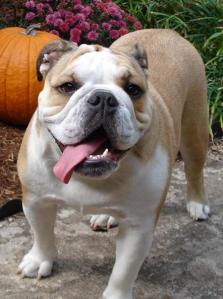By: Dr. Hilary Slaven
 The alternate title for this blog was “Why can’t I hear the news with my pug on my lap unless the TV volume is turned up to 11?”
The alternate title for this blog was “Why can’t I hear the news with my pug on my lap unless the TV volume is turned up to 11?”
We could be talking about any of those short-nosed breeds: English and French bulldogs, Boston Terrier, Pug, Boxer, Pekingese and Shih Tzu. These pooches have been bred over time to have shortened noses, causing several different problems that all contribute to the same effect. Mildly affected animals will snore or snort, especially with exercise. Severely affected animals will have significantly loud breathing which can lead to serious difficulty in breathing and even to respiratory crisis.
We often get asked, “what exactly is the reason behind the snort?” and “do you realize how many times my pooch wakes me up at night?” and “do you sell earplugs here?”
The short-nosed (the true term is ‘brachycephalic’) dog will have small nostrils, which makes it difficult to pull air into the nasal cavity. Over time, this can cause further damage inside the skull and in the back of the throat as a dog has to continually pull air hard to physically get it into his lungs. Friction between tissues that in a ‘normal’ dog would never touch can cause thickening of the tissues and permanent deformity (almost like a callous). These changes make the airway even smaller and more difficult for your sweet puggy puppy to move air in and out of her lungs. This kind of work to breathe can make it difficult for more severely, chronically affected dogs to get enough air to exercise.
There are surgical options for some patients that can involve widening the nostrils and resecting tissue inside the throat that occludes the airway. This is generally performed by veterinary surgeons at specialty clinics.
What can I do at home?
1. Provide daily exercise for your pup. Gradually work up to a 30 minute walk every day or lively game of fetch. We recommend working with your veterinarian to find a regimen that is appropriate for your pup and your lifestyle.
2. Promote healthy eating habits to prevent weight gain. Obesity will exacerbate breathing problems seen with these breeds.
3. Regular examinations can help your veterinarian to work with your family to develop the best care regimen for your pet’s individual needs.
4. Be attentive to any change in your pet’s breathing patterns, difficulty breathing, coughing, and lack of energy. These problems can worsen as a dog ages and may need to be managed differently in later years of life. It can be life-threatening in severe cases and monitoring the severity of the condition in your pet will help you make informed decisions about your pet’s care.
5. Watch for gastrointestinal signs like vomiting and regurgitation that can be related to the brachycephalic syndrome.
Remember that while the snoring and noise that these breeds make are often cute and endearing, they can also be uncomfortable and even life-threatening in severe cases. These animals are special with wonderful personalities and attitudes and make awesome companions BUT it is up to us to be aware of their special needs and keep on top of their health to make their lives happy and long.

